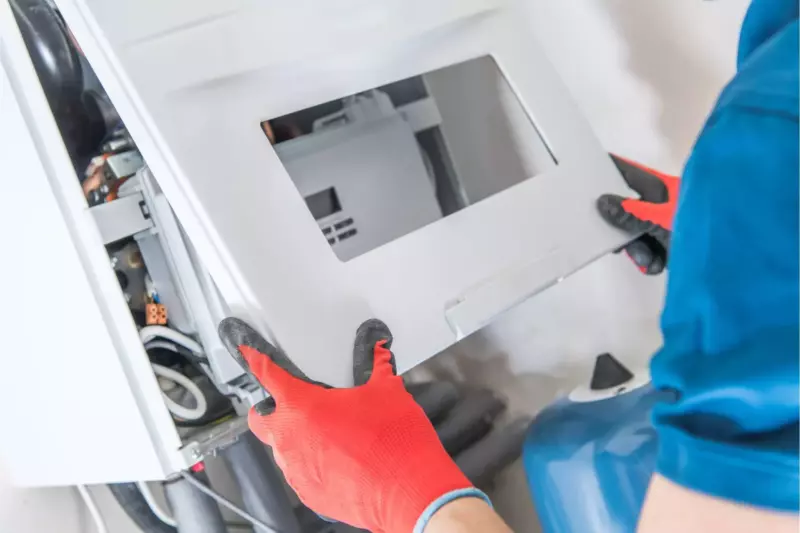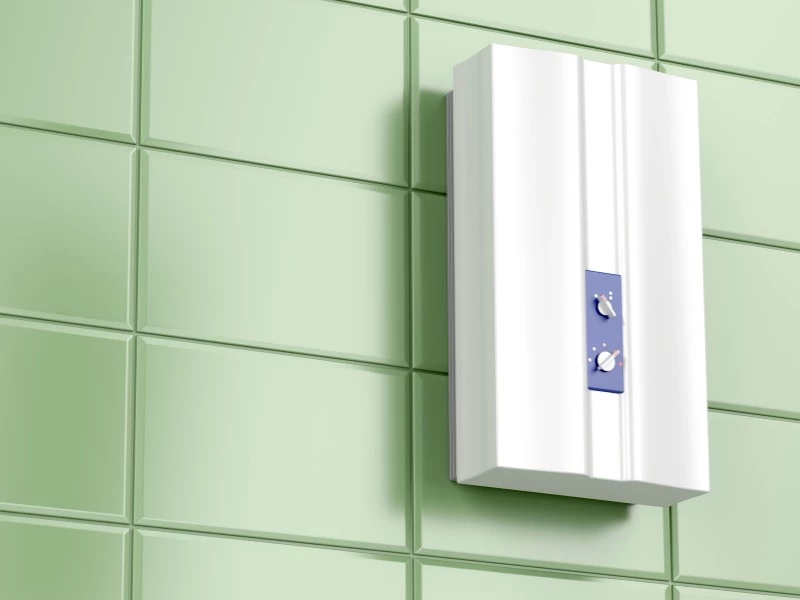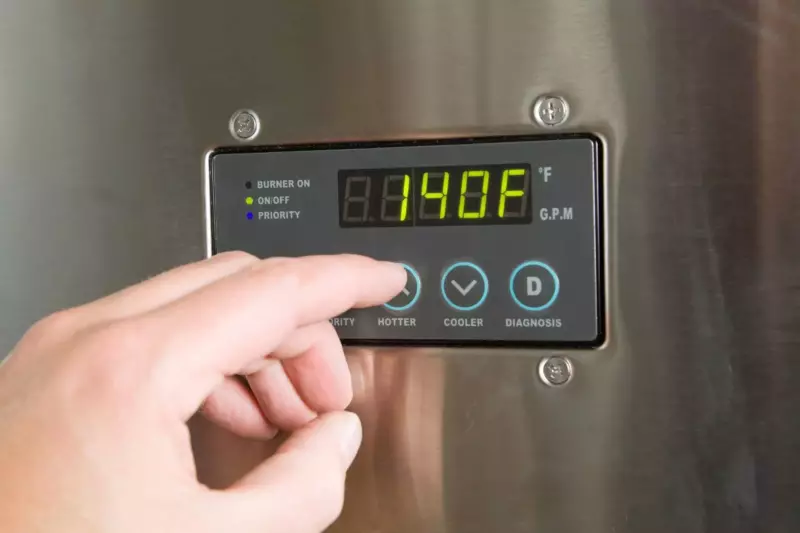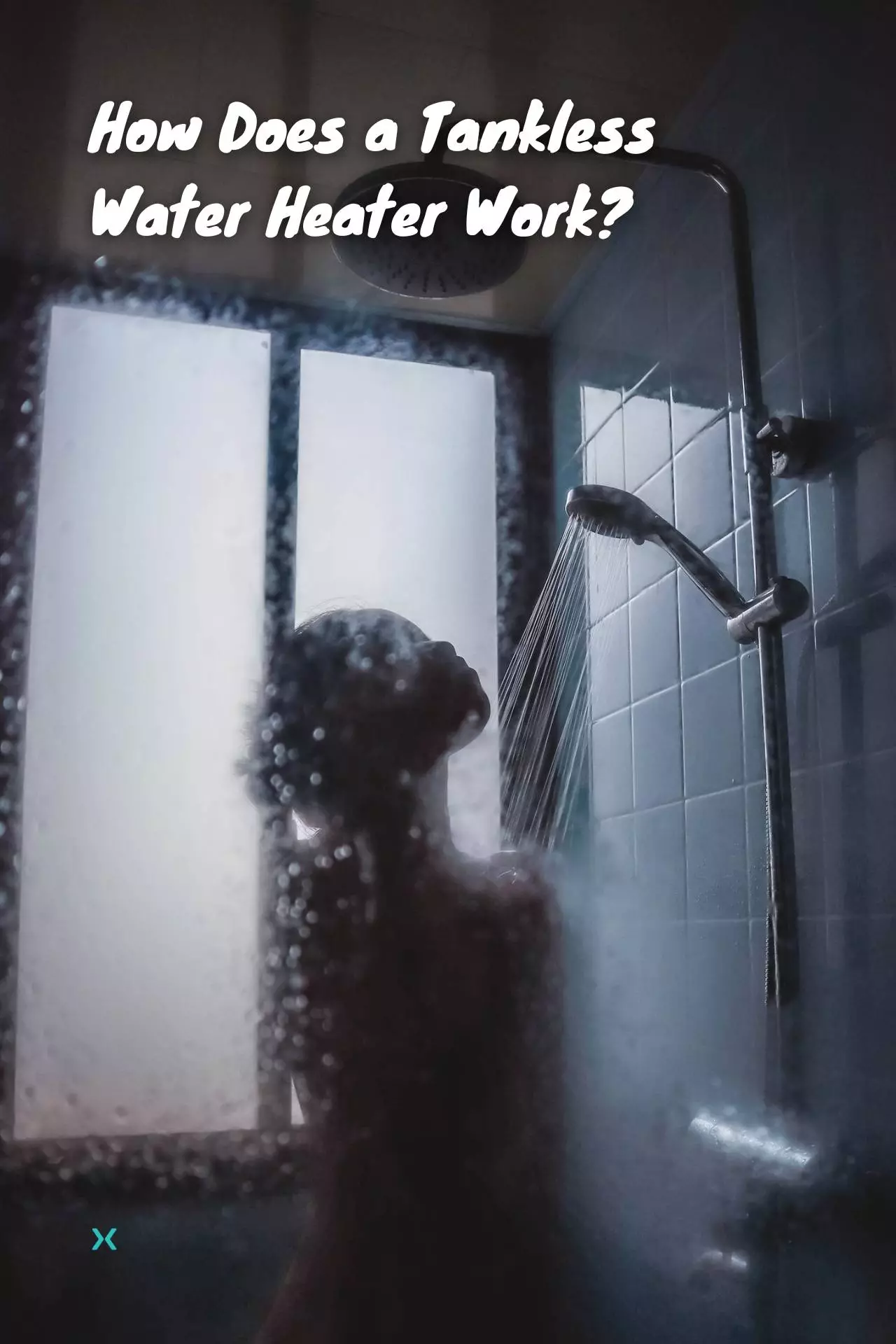How Does a Tankless Water Heater Work?
If you’re looking for an energy-efficient way to heat water in your home, a tankless water heater might be the solution you’ve been searching for.
In this article, we’ll take an in-depth look at what tankless water heaters are, how they work, and the benefits they offer over traditional water heaters.
Table of Contents
💧 Understanding Tankless Water Heaters

What is a Tankless Water Heater?
A tankless water heater is a type of water heating system that heats water on-demand without the need for a storage tank.
When you turn on a hot water faucet, cold water flows through the heater’s heat exchanger, which quickly heats the water before it travels to your faucet.
This process eliminates the need for a tank to store hot water, making tankless hot water heaters more energy-efficient and offering a more continuous hot water supply.
One of the significant advantages of a tankless water heater is that it can provide hot water on-demand without the need for a large storage tank.
This means you can have hot water whenever you need it without waiting for a tank to refill.
Additionally, tankless heaters are more energy-efficient than traditional water heaters, which can help you save money on your utility bills over time.
☀️ Traditional Water Heaters vs. Tankless Water Heaters
Traditional water heaters can be inefficient because they store and continuously heat large amounts of water, even when not in use.
This leads to constant energy usage and high utility bills.
In contrast, a tankless water heater only heats the water you need, minimizing energy consumption and costs.
Another advantage of a tankless water heater is that it takes up less space than a conventional water heater.
Traditional water heaters can be bulky and take up a lot of room in your home, while tankless water heaters are typically smaller and can be mounted on a wall, freeing up valuable floor space.
Related Reading: Tank vs Tankless Water Heater: The Great Water Heater Debate
☀️ Types of Tankless Water Heaters: Electric and Gas
There are two types of tankless water heaters: electric and gas.
Electric tankless water heaters use electrical resistance heating coils to heat the water as it passes through the unit.
Gas tankless water heaters use a natural gas burner to heat the water instead and require a gas line and proper ventilation.
Electric tankless water heaters are typically less expensive to install than gas tankless water heaters, but they may not be as efficient in areas with high electricity costs.
Gas tankless water heaters, on the other hand, gas tankless water heaters, are more expensive to install but may be more cost-effective in the long run, especially in areas with low gas prices.
When choosing between a gas or electric tankless water heater, it’s essential to consider your specific needs and budget.
A professional plumber can help you determine which type of tankless water heater is right for you.
💧 The Science Behind Tankless Water Heaters

When it comes to hot water, tankless water heaters are a popular choice for many homeowners.
They offer a range of benefits, including energy efficiency, space-saving design, and the convenience of on-demand hot water.
But how do they work?
Let’s take a closer look at the science behind how tankless water heaters work.
☀️ Heat Exchanger Technology
The heart of a tankless water heater is its heat exchanger.
This device is responsible for transferring heat from the energy source – whether that’s gas or electricity – to the water that passes through it.
The size of the heat exchanger is typically proportional to the water flow rate required by the household.
This means that larger households with higher hot water demand require a larger heat exchanger to ensure water is heated quickly and efficiently.
☀️ How Does The Heat Exchanger Work?
Essentially, it’s a series of coils or pipes that are heated by the energy source.
As water flows through these coils, the heat is transferred to the water, raising its temperature.
The result is hot water that can be used for everything from showering to washing dishes.
☀️ Flow Sensors and Activation
One of the key benefits of a tankless water heater is that it only heats water when you need it.
When you turn on a hot water faucet in your home, a flow sensor in the tankless water heater detects the water flow, activating the heat exchanger.
The heat exchanger then he up the water quickly using its heat-capturing coils.
The heating process is instantaneous, and no hot water is stored in a tank as it is for the traditional water heating system.
This means you don’t have to wait for a tank to fill up with hot water before you can use it – you can enjoy hot water on demand whenever you need it.
☀️ Temperature Control and Modulation
Tankless water heaters come with intelligent electronic controls that enable precise temperature control.
The temperature is adjusted according to the rate of water flowing through the heat exchanger.
Efficiency is optimized by modulating the amount of gas or electricity supplied to control the heat produced.
This means the tankless hot water heater can adjust its output to match your hot water needs, ensuring you always have hot water at the desired temperature without wasting energy.
Tankless heaters offer a range of benefits over traditional water heating systems.
By using heat exchanger technology, flow sensors, and intelligent temperature controls, they provide hot water on demand without the need for a bulky storage tank.
If you’re looking for an energy-efficient, space-saving solution for your hot water needs, a tankless water heater could be the perfect choice for you.
💧 Benefits of Tankless Water Heaters

When it comes to heating water in your home, there are many options to choose from.
One of the most popular options recently has been tankless water heaters.
These innovative devices have a lot of benefits over traditional water heaters, and they can make a big difference in your home.
Let’s take a closer look at some of the benefits of tankless water heaters.
✅ Energy Efficiency and Cost Savings
One of the biggest benefits of tankless water heaters is their energy efficiency.
Unlike traditional water heaters, which keep a large tank of water hot at all times, tankless water heaters only heat water when it is needed.
This means that they use less energy overall, which can save you a lot of money on your energy bills in the long run.
In fact, tankless water heaters deliver are up to 30% more energy efficient than traditional water heaters!
Another way that tankless water heaters can save you money is through their lifespan.
While traditional water heaters typically last around 10-12 years, tankless water heaters can last for up to 20 years with proper maintenance.
This means that you won’t have to replace your water heater as often, which can save you a lot of money over time.
✅ Space-Saving Design
Another benefit of tankless water heaters is their space-saving design.
Traditional water heaters require a large tank to store hot water, which can take up a lot of space in your home.
Tankless heaters, on the other hand, are much smaller and can be installed on a wall or in a small utility closet.
This can free up valuable space in your home, which is especially important if you have a small living space.
✅ Continuous Hot Water Supply
Have you ever been in the middle of a shower only to have the hot water run out?
It’s not a pleasant experience!
With a tankless water heater, you’ll never have to worry about running out of hot water again.
Tankless heaters provide a continuous supply of hot water, which means that you can take a shower while someone else is washing dishes, and everyone will still have hot water.
This can be a huge benefit for larger households or families.
✅ Longer Lifespan and Durability
Finally, tankless water heaters are known for their durability and long lifespan.
Unlike traditional water heaters, which can develop leaks and other issues over time, tankless water heaters are built to last.
They are made with high-quality materials, and their components can easily be replaced should they need repair.
This means that you can enjoy hot water in your home for many years to come without having to worry about replacing your water heater.
Overall, there are a lot of benefits to using a tankless water heater in your home.
From energy efficiency and cost savings to space-saving design and continuous hot water supply, tankless water heaters can make a big difference in your daily life.
If you’re in the market for a new water heater, be sure to consider a tankless option!
💧 Installation and Maintenance

🧰 Professional Installation Requirements
For gas-powered tankless water heaters, installation should be carried out by a certified plumber to ensure that all gas lines, ventilation, and other installation requirements are met according to the manufacturer’s specifications.
🧰 Ventilation and Gas Line Considerations
Gas-powered tankless water heaters require proper ventilation to ensure the safe release of potentially harmful exhaust gases.
An adequate gas line is also necessary to provide fuel to the burner.
An Electric tankless heater does not require ventilation.
🧰 Routine Maintenance and Cleaning
Like all home appliances, tankless water heaters require regular maintenance to ensure they perform optimally and last as long as possible.
It’s essential to clean the heat exchanger and check for scale buildup regularly to ensure it keeps working efficiently.
Related Reading: Your Quick Guide to Tankless Water Heater Maintenance
💧 The Bottom Line

Tankless water heaters provide an energy-efficient, space-saving solution to hot water supply in your home.
Electrical or gas-powered, they offer a continuous supply of hot water, while their heat exchanger technology heats the water on-demand.
Proper installation, ventilation, and routine maintenance are essential in ensuring the longevity and optimal performance of your tankless water heater.
Looking for reliable and professional plumbing services in the area? Look no further than Phyxter Home Services.
Our experienced team of plumbers is available to help with any plumbing-related emergency or maintenance needs.
With quick response times and competitive pricing, we take the stress out of even the toughest plumbing problems.
Check our page on plumbing services to see if Phyxter services your area. Let us help keep your home’s plumbing in top shape.
Want to learn more about your home’s plumbing problems? Feel free to check out our other plumbing articles!

